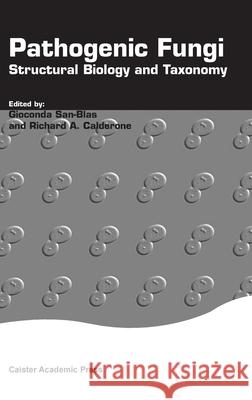Pathogenic Fungi: Structural Biology and Taxonomy » książka
Pathogenic Fungi: Structural Biology and Taxonomy
ISBN-13: 9780954246471 / Angielski / Twarda / 2004 / 371 str.
During the past decade we have witnessed a mushrooming of papers in the area of medical mycology, detailing major advances in areas such as genomics, molecular and cellular biology, molecular epidemiology, immune response and vaccine development, and strategies to combat infections in humans. This sheer volume of information makes it extremely difficult for the busy research scientist and/or teacher of medical mycology to keep abreast of all the latest advances. This book, together with its companion volume Pathogenic Fungi: Host Interactions and Emerging Strategies for Control, brings together expert international authors who critically review current topics, and through the provision of extensive reference sections positively encourage readers to pursue the subject in greater detail. The book is divided into two sections: "Fungal Dimorphism and Pathogenicity" and "New Taxonomic Tools." The first section focuses on morphogenesis, the cell cycle, and the cell wall of human pathogens. These play a major role in elucidating fungal relationships, both with the environment and with the host. Experts in fungal structural biology contribute in-depth reviews on a variety of topics with a focus on molecular and biochemical analysis. The final chapter in this section presents a fascinating review of how mathematical modeling can be used to understand the building of three-dimensional cell structures in the morphogenetic process. The second section, entitled "New Taxonomic Tools," presents novel approaches to aid the understanding of strain variability, the significance of environmental and patient strains, and the relatedness of "uncultured" fungi. In addition the use of molecular tools for the taxonomic classification of previously unclassifiable fungi is featured.











